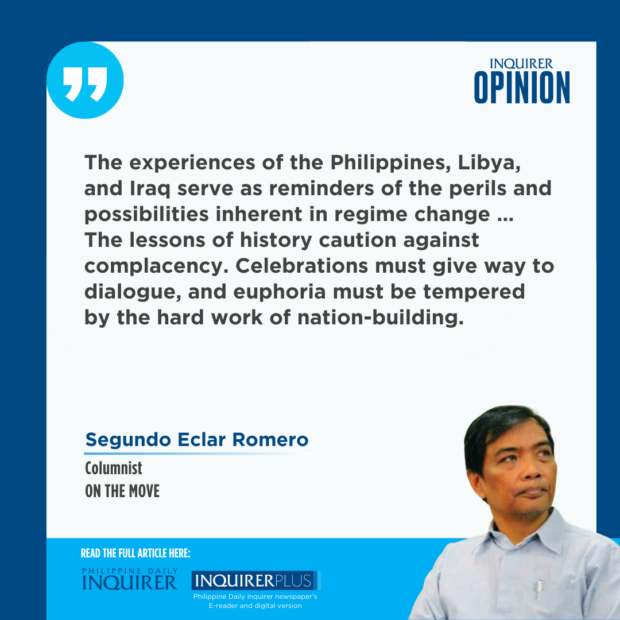
The jubilant streets of Damascus are awash with a sense of freedom. Women perform the “zaghrouta,” a piercing, celebratory ululation; men chant slogans; and the nation collectively breathes a sigh of relief. The fall of Bashar al-Assad and his flight to Moscow signals the end of an era of repression. Yet, amidst the celebrations, the echoes of history remind us that such moments are but the first steps in the arduous journey of transition.
Assad’s dramatic departure is reminiscent of other despots forced into exile: Ferdinand Marcos Sr. fleeing to Hawaii in 1986, laden with treasures looted from the Philippine people; Muammar Gaddafi’s brutal demise in Libya; and Saddam Hussein’s humiliating fall in Iraq. Each instance of a dictator’s downfall has triggered euphoria, but also exposed deep challenges in the aftermath. For Syria, these challenges loom large, as the nation grapples with the legacies of autocratic rule, civil war, and external meddling.
For over 50 years, the Assad family ruled with an iron fist, crushing dissent and maintaining power through a maze of alliances. The civil war that erupted in 2011 triggered heightened repression, leading to decades of unimaginable suffering: hundreds of thousands dead and millions displaced.
Scenes of jubilation in Syria mirror those of the Edsa People Power Revolution in the Philippines, where citizens took to the streets to topple Marcos Sr.’s regime. Just as Filipinos dismantled the vestiges of a dictator’s reign—smashing statues and reclaiming public spaces—Syrians now seize the moment to exorcise symbols of the Assad family’s domination. Yet, while the Philippines managed a relatively swift transition to democratic rule, Syria’s path is far more uncertain.
History offers cautionary tales for Syria. Libya and Iraq, both torn apart after the fall of autocratic regimes, failed to establish stable political orders. These examples highlight the dangers of power vacuums and unbridled factionalism. Syria’s deeply fragmented opposition, including Islamist groups like Hayat Tahrir al-Sham (HTS) and Kurdish factions under the Syrian Democratic Forces, is emblematic of these challenges. HTS, despite its pledge to embrace inclusivity, remains burdened by a controversial past with ties to al-Qaida, casting doubt on its ability to foster unity.
The stakes are further complicated by Syria’s geopolitical significance. Regional powers such as Turkey, Iran, and Israel, alongside global actors like Russia and the United States, have entrenched themselves in the conflict. Israel’s recent seizure of a buffer zone in the Golan Heights, Turkey’s ongoing skirmishes with Kurdish forces, Russian interests in maintaining influence, and US preemptive strikes to deny weapons caches from remnant ISIS forces, underscore the volatile landscape. Any transition must navigate these external pressures while addressing domestic fissures.
The nation’s ethnic and sectarian divisions, exacerbated by years of war, require sensitive reconciliation efforts. The abundance of weapons among various factions raises the specter of prolonged violence, as former allies in the fight against the Assad regime may turn on one another. Syria’s infrastructure lies in ruins, and its oil reserves, controlled by Kurdish forces, remain a contentious issue. International aid and investment are essential for rebuilding, but political instability and mistrust could hinder these efforts.
Despite these challenges, there are reasons for cautious optimism. Rebel leaders have expressed commitments to pluralism and minority rights, signaling a potential departure from the Assad regime’s exclusionary policies. Turkey, despite its complex role in the conflict, sees stability in Syria as a chance to repatriate millions of Syrian refugees. The international community, led by the United Nations, has pledged support for a peaceful transition. Such external engagement, coupled with lessons learned from other post-conflict transitions, could provide a framework for demilitarization, power sharing, and justice.
The experiences of the Philippines, Libya, and Iraq serve as reminders of the perils and possibilities inherent in regime change. While the fall of Bashar al-Assad is a victory for the Syrian people, the road ahead demands wisdom, resilience, and unity.
In the Edsa People Power Revolution, Filipinos found strength in collective action, dismantling martial rule, and reclaiming democracy. Similarly, Syrians now have the opportunity to forge a new identity rooted in inclusivity and justice. The fall of Bashar al-Assad is an opportunity for reinvention, though fraught with risks. The lessons of history caution against complacency. Celebrations must give way to dialogue, and euphoria must be tempered by the hard work of nation-building.
—————-
doyromero@gmail.com

